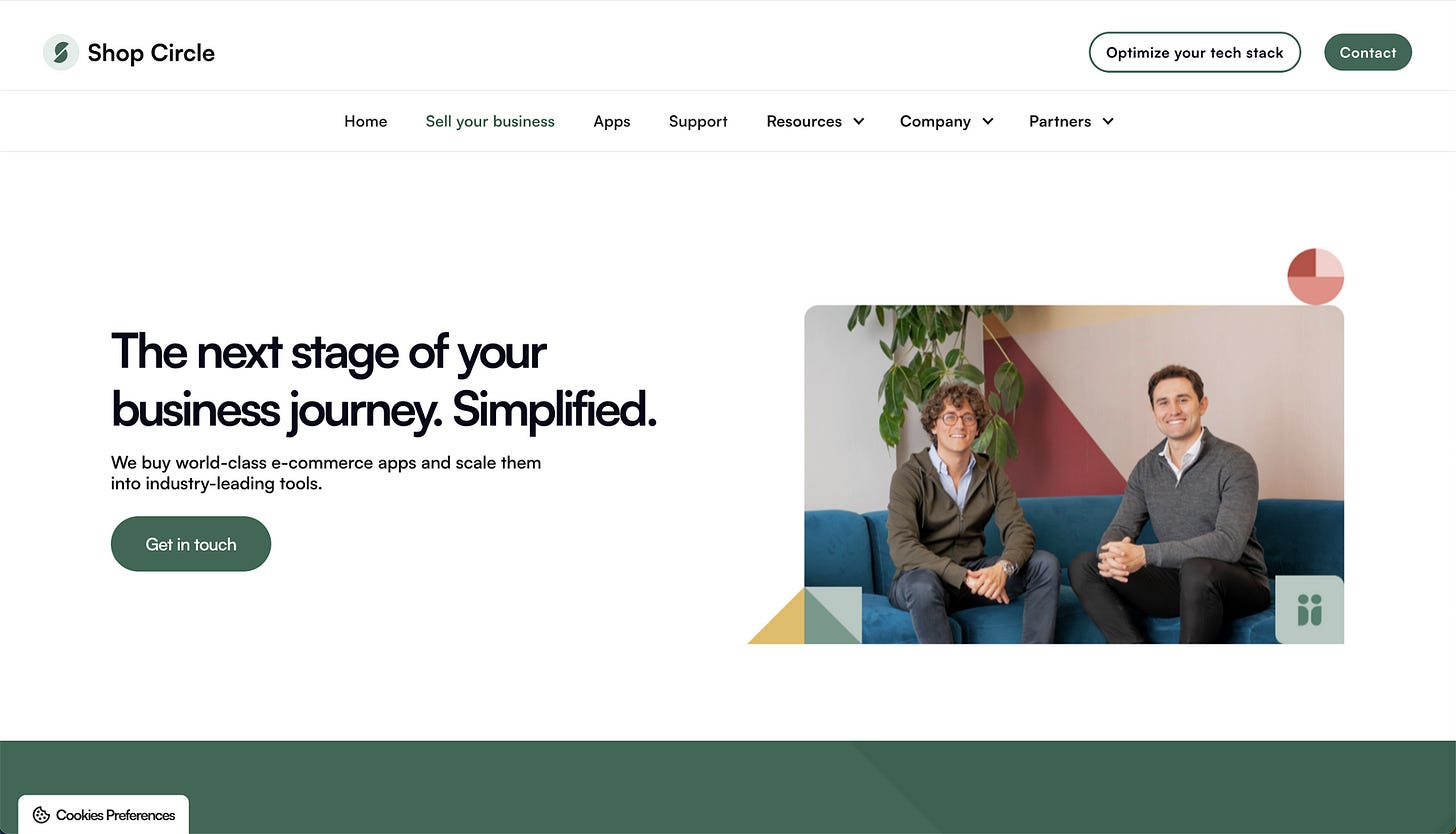How to get (micro) acquired?
Introduction
As part of our Checkout X pivoting efforts, we decided to try building a completely new product - Vanga AI.
Sparing the details, Vanga AI ultimately failed to have the revolutionary impact on the Shopify Ecosystem that we’d initially hoped for, however, we still managed to build a solid product with a growing customer base.
I’d heard about Acquire.com in the past, so when I decided to move away from the Shopify App building business, I figured it was worth the shot.
So 18 months after its inception, Vanga AI got officially acquired on Acquire.com 🎉.
If you’re considering selling your SaaS business in the near future, I hope this article can give you some actionable tips on getting acquired:
Who’s this article for?
I’m writing from the perspective of a SaaS founder with growing revenue and customer base - actively looking to sell the business.
Marketplaces like Acquire.com work best for SaaS projects looking to exit somewhere between $10k - $5M
Over $5-$10M you’re probably looking for strategic buyers or private equity funds, so it’s best to hire an M&A advisor. ( I assume )
For pre-revenue SaaS projects - revenue is the most important factor for those kinds of acquisitions. If the revenue is zero it’s going to be hard to sell a half-baked product for money. ( Though, I’m sure there are exceptions )
Managing expectations
As members of the startup community, it’s easy to look at the successful moonshot stories and multimillion “seed round” valuations, and expect that any exit means you get to buy a private jet.
I agree, my fellow aspiring entrepreneur “PLAYUH”, private jets are cool and I honestly hope you get there, however, you know what else is cool → a house 🏡, the freedom to travel the world 🌍, getting rewarded for your extra hard work 💪, this kind of stuff. Those days we tend to forget that a million dollars are A MILLION FUCKING DOLLARS 💰 - a life-changing amount for most people.
My point being that, only 1% of the startups will make it big, but even if you don’t make the 1% you can still get acquired at a reasonable valuation.
In this context, a reasonable valuation is usually somewhere between 2x-5x ARR
Unlike traditional acquisitions, buyers on platforms like Acquire.com are opportunity driven - they usually don’t get strategic value from your SaaS but rather want to acquire a business at a fair price.
Buyers need to account for the risk of everything going to shit 💩, while hoping they’ll manage to grow the business and make a profit.
Buyers are not investors
Their acquisition money is not going into the business, but to your pocket.
The acquisition money is just the start, they’ll also need to pay for all expenses from now onwards.
Planning to sell your SaaS in the future?
If you’re not quite ready to sell your business yet but you want to sell at a later stage, it’s better to start preparing now:
Prepare P&L reports on a monthly basis
Monitoring your P&L is essential for your business anyways, but let’s be honest - we’ve all been a bit sloppy with our accounting. If you want to sell - buyers will want to see how the company was performing historically, so there’s one more reason to act like an adult and keep excellent track of your finances. ( There are a ton of templates online )
Create proper documentation
Another essential business practice: creating documentation. Yet, every company relies on folklore ( knowledge transferred from employee to employee ) more or less. Push yourself to create documentation - it matters a ton once you want to sell the company.
Document processes
Write good help articles
Write tests and technical docs
Consider your business model
Not all revenue is made equal. There is a hierarchy of revenue:
Recurring revenue
Usage-based revenue
One-off purchases / Service revenue
Buyers want predictable revenue. In the end, they’re evaluating your business based on how much it makes. If you plan to sell your business in the future, consider pushing your revenue toward the recurring type.
Preparation for listing your business
Ready to sell? You need to prepare the following documentation:
P&L Statements
Prepare P&L Statements for your business
Yearly P&L Statements for the whole history of your business
Monthly P&L Statements for the last 12-24 months
Detailed Growth report
From my experience, most of the questions you’ll get will be regarding the growth of the business as buyers will probably want to keep growing it and they will want to be able to make an accurate projection of the business in the near future.
Try to be as explicit as possible about your growth. This will prove that you know what you’re doing and assure potential buyers their investment won’t regress after the acquisition.
Example documents you can create:
Current customer numbers - Number of customers, MRR, Trials, Expected revenue, etc
Acquisition channels, cost per acquisition, etc - are they repeatable?
Activation metrics
Customer & Revenue churn
Etc
Documentation
As mentioned above - you need documentation on how your business runs. Process documentation, help center articles, tech documentation etc.
Assets list and transfer plan
What are you actually selling?
Are you selling the company or just the assets?
In many cases, it’s much easier to just make an Asset Purchase Agreement and transfer the assets, without transferring company ownership. That’s especially true if the buyer is in another country or/and you don’t have employees.
Do you have employees?
Are they going to keep working in the business after the sale? How would that work?
Do you want to stay in the business for a period?
Many buyers prefer to keep the founder working on the business at least for a period. Are you ok with that?
How are you going to transfer the digital assets?
What are your digital assets?
Your codebase
Your hosting account
Your domains
Your slack/notion/helpdesk
Your Shopify account
etc
Make a list of everything that you’ll need to transfer and plan on how it can be done. Some changes may require additional dev work.
Set a valuation
Setting the right valuation is crucial to generate interest from potential buyers.
Reasonably priced companies attract interest - badly priced ones don’t.
Keep in mind that you’ll need to collaborate with the buyer, so you need someone who’s serious and business-savvy. It’s best to offer a good deal ( for both sides ) and have a choice of buyer.
Factors to consider when setting a valuation:
Determination to sell
How determined are you to sell the company? Is it a sale at all costs?
Is there a minimum amount you’re looking for?
How fast do you need to sell?
Do you need to finish the sale in the next 3 months?
Can you continue growing the business and try again at a later stage?
Will you keep working in the business?
Will there be employees that will continue working in the business?
Revenue & type of revenue?
Is the revenue recurring?
Is the revenue usage-based?
Is it one-time purchases or service revenue?
Growth rate?
Profit
Is the business profitable?
What’s the profit margin?
Intellectual property
Codebase
How complex is the product to build?
How complex is the product to maintain?
Are there issues with the product that need to be fixed?
Other assets?
What other assets do you have?
Marketing assets? Social media following, mailing lists etc?
Patents, trademarks?
Other stuff?
How I valued Vanga AI
Facts I took into consideration
I was determined to sell in the next 3 months
I had accepted a new position ( which ironically fell through 😄 ) so I needed to sell ASAP
There was no team coming with the asset
I wasn’t willing to keep working on the project
We’d already disbanded the team as everyone wanted to pursue new ventures
The business was growing 30% month over month
The business wasn’t profitable
There was 80% gross margin
The salaries of the team pushed the business on the red
60% of our revenue came from usage
My valuation formula:
Last month’s revenue * 24 months
As we were growing 30% MoM it didn’t make sense to take ARR into consideration, instead I used our last month’s revenue ( which happened to be December 22’ )
As a usage-based e-commerce SaaS, November and December are the strongest months of the year. I knew buyers would expect a drop in usage revenue in the following months.
I believed a fair valuation is somewhere between 24x-36x last month’s revenue - I opted for the low end as I wanted to sell fast and be able to pick a buyer.
In the end, the valuation equaled around 5x our Annual Revenue
Where to list your startup
I found the Vanga AI buyer from there
Very active for Shopify Apps and SaaS businesses in general
This article is based on their process
SASI
sasi.unionworks.co.uk/for-sale
For Shopify apps only
Flippa / Empire Flippers
flippa.com ; empireflippers.com
Other marketplaces for online businesses, I don’t think they’re very popular among SaaS
I tried Empire Flippers, but their onboarding didn’t make sense for my business
App aggregators
shopcircle.co/sell-your-business ; appregator.io & others
There are a couple of Shopify App aggregators that you can approach directly
For Shopify apps only
The acquisition process
Getting listed
Every platform has a slightly different questionnaire. I recommend Acquire.com’s guide on listings:
How to Create the Perfect Listing When Selling Your Business on Acquire.com
Here are a couple of questions that you’ll need to provide answers to:
Business description
What do you do?
What features do you have?
Who’s your target customer?
etc
Business size
Revenue
Customers
etc
Valuation justification
How did you get to that valuation?
Why is your business worth that amount?
What are you selling?
List assets you’re selling
Why are you selling?
Explain why you wish to sell your business.
It’s very important to be honest here - buyers need to be careful for businesses that are built on shaky grounds so they need a realistic reason for the sale.
Your timeline
Pick a reasonable timeline for:
First calls
Getting offers
Deciding on which offer to pick
This timeline can be extended but you need to have it. Otherwise, any buyer that gives you an offer will pressure your for an answer ASAP.
Evaluating buyers
Selling your business is a project on its own. You’ll need to collaborate with the buyer and they’ll need to come up with their end of the deal. A bad buyer can fail your acquisition, so choose carefully.
I recommend that you spend some time looking them up and talking to them.
A couple of things to consider:
Do they have any past acquisitions?
What’s their background? What’s their team?
Are they asking you adequate questions?
Are they thinking critically and asking hard questions?
Do they look like they know what they’re doing?
Do they look serious and reliable?
What’s their game? Why are they looking into buying your business?
Field offers
If you start getting actual offers - congrats! 👏
Now which one to choose? There are a couple of factors:
Purchase amount
What’s the total amount you’ll be getting?
Terms
What are the terms of the deal? Is it all cash on purchase?
Buyers may offer delayed payment, performance based pay, stock swap etc
Consider the main risk on non-immediate cash - there’s no escrow so if the buyer doesn’t follow through on their commitment you’ll need to sue them - which can be unrealistic depending on the sum and the jurisdiction.
Beware of stock swaps and performance based pay - their value is beyond your control. Consider the risk vs reward probability if you accept such terms.
Reliability
Everything I mentioned in the previous section. Do you trust those guys they’ll follow through? Which offer seems the most reliable?
🤨
When I talk about trusting the buyer keep in mind - you can never trust a stranger completely, but you can’t sell the business without trusting anyone. Follow your instincts - if there are no red flags and the other side looks legit - go for it.
Due Diligence
Once you accept an offer the buyer will perform due diligence - they’ll need to validate that everything you told them is true. In the meanwhile, it’s not possible to negotiate with other buyers from Acquire.com
Discuss with the buyer what they need and how to give them access - but beware - you can’t protect everything. Sign an NDA before going forward, as there will be confidential information being shared. It’s not possible to audit your codebase without getting the codebase, for example.
My advice for this stage is: Be patient, transparent and responsive. Most of the times there will be small inaccuracies and that’s all right - make sure the buyer is aware of everything before their purchase - not after.
Escrow and Transfer
If the Due Diligence goes well, it’s time to sign your purchase agreement and proceed to escrow.
For those unfamiliar, escrow is a third-party arbiter that will hold the money until the assets are transferred and the deal is completed. It gives security to both sides.
Here’s how it works:
Terms are set in the escrow provider ( amount, assets to be transferred, conditions )
The buyer sends the money to the escrow provider
The escrow provider confirms they received the money
The seller transfers the assets to the buyer
The buyer confirms they received the assets to the escrow provider
The escrow provider sends the money to the seller
The seller receives the money
This whole process takes time. For us, it took around 3 weeks, mainly because Escrow.com held the buyer’s payment for a week and Shopify was very slow to transfer the app to the new buyer.
—
The asset transfer step is just… bizarre. You realise how weird SaaS businesses really are. In a traditional business sale you would be giving access to funds, keys to buildings/machines, introducing key employees - not in SaaS. The SaaS process is just sharing passwords and clicking “transfer account” on some websites.
This is the moment you get to realise that whoever holds a couple of key passwords is the real company owner → the cap table doesn’t matter.
—
⚠️ Be really careful with the assets transfer as there are things that can go wrong. In my case, with the transfer of the infrastructure accounts, somehow the infrastructure configs changed resulting in a complete crash of the app. It was a fun sleepless night of attempting fixes 😰
Acquired 💰
If you managed to go through everything - congratulations 🎉.
You’ve made an exit! 🚀
On Acquire.com’s pricing update
While writing the article, Acquire.com announced they will start charging a 4% commission on a completed sale, here’s the update:
How Our Closing Fee Helps You Get Acquire’d Easier Than Ever
https://blog.acquire.com/acquire-closing-fee-june-2023/
When I sold Vanga AI, the service was mostly free, but the update would not change my decision to list there. The reality is that Acquire.com and SASI were the only places I got offers from. Acquire.com helped me with finding a buyer and giving me structure on how to sell the business.
I completely support their decision on monetisation and I hope they keep growing so they can provide more and more opportunities for entrepreneurs like me and you. 🤘
p.s. I am not affiliated with Acquire.com, SASI or any of the other solutions - but happy to talk about them 🙂!
UPDATE: I got invited on the Acquire.com podcast
After my article got published, the Acquire.com team invited me on their podcast, which was super fun 🙏
Check it out here:
I hope this guide was useful to you.













